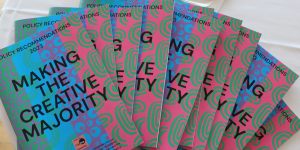 Making the Creative Majority is a new report from the All-party Parliamentary Group (APPG) for Creative Diversity launched at the House of Lords earlier this week. The report analyses ‘What Works’ to support diversity and inclusion in creative education and the talent pipeline with a focus on the 16+ age category.
Making the Creative Majority is a new report from the All-party Parliamentary Group (APPG) for Creative Diversity launched at the House of Lords earlier this week. The report analyses ‘What Works’ to support diversity and inclusion in creative education and the talent pipeline with a focus on the 16+ age category.
I attended the event for two reasons. The research closely aligns to my own: the report’s focus is work in the creative industries generally; mine is on work in the media industries specifically, so there is much common ground. But my invitation was also prompted by having found myself in the unusual position (for me) of also being the subject of the research. One of my Level 5 units – Client & Audience – provides the report with its case-study for work-simulated learning (see pp 137-138 of report). It is a unit in which media production students work on a live brief for an external organisation, but within a safe and highly controlled University environment. The report suggests that this model can reach students for whom the offer of internships and other forms of work-integrated learning will simply not reach.
The new report has been produced by King’s College London, University of Manchester, University of the Arts London, YouTube, Paul Hamlyn Foundation, and the Creative Policy and Evidence Centre. Key findings are: the creative workforce is dominated by graduates; there is huge inequality of gender, ethnicity and class across creative HE courses and employment outcomes; the Russell Group of Universities has the most work to do to support DEI in creative HE; and apprenticeships aren’t working for the creative industries.
The report also includes a series of evidence-informed recommendations for government and Higher Education.


Making the Creative Majority full report is available here.











 Expand Your Impact: Collaboration and Networking Workshops for Researchers
Expand Your Impact: Collaboration and Networking Workshops for Researchers Visiting Prof. Sujan Marahatta presenting at BU
Visiting Prof. Sujan Marahatta presenting at BU 3C Event: Research Culture, Community & Can you Guess Who? Thursday 26 March 1-2pm
3C Event: Research Culture, Community & Can you Guess Who? Thursday 26 March 1-2pm UKCGE Recognised Research Supervision Programme: Deadline Approaching
UKCGE Recognised Research Supervision Programme: Deadline Approaching ECR Funding Open Call: Research Culture & Community Grant – Apply now
ECR Funding Open Call: Research Culture & Community Grant – Apply now ECR Funding Open Call: Research Culture & Community Grant – Application Deadline Friday 12 December
ECR Funding Open Call: Research Culture & Community Grant – Application Deadline Friday 12 December MSCA Postdoctoral Fellowships 2025 Call
MSCA Postdoctoral Fellowships 2025 Call ERC Advanced Grant 2025 Webinar
ERC Advanced Grant 2025 Webinar Update on UKRO services
Update on UKRO services European research project exploring use of ‘virtual twins’ to better manage metabolic associated fatty liver disease
European research project exploring use of ‘virtual twins’ to better manage metabolic associated fatty liver disease